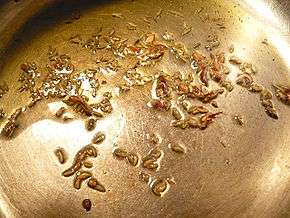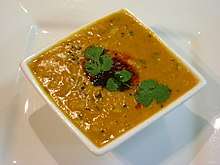Tempering (spices)
Tempering is a cooking technique used in the cuisines of India, Nepal, Pakistan, Bangladesh, and Sri Lanka, in which whole spices (and sometimes also other ingredients such as dried chillies, minced ginger root or sugar) are roasted briefly in oil or ghee to liberate essential oils from cells and thus enhance their flavours, before being poured, together with the oil, into a dish.[1] Tempering is also practiced by dry roasting whole spices in a pan before grinding the spices.

Tempering is typically done at the beginning of cooking, before adding the other ingredients for a curry or similar dish, or it may be added to a dish at the end of cooking, just before serving (as with a dal, sambar or stew).[2]
Ingredients used

Ingredients typically used in tempering include cumin seeds, black mustard seeds, fennel seeds, fresh green chilis, dried red chilis, fenugreek seeds, asafoetida, cassia, cloves, urad dal, curry leaves, chopped onion, garlic, or tejpat leaves. When using multiple ingredients in tempering, they are often added in succession, with those requiring longer cooking added earlier, and those requiring less cooking added later. In Oriya cuisine and Bengali cuisine, a mixture of whole spices called panch phutana or panch phoron is used for this purpose.[3]
Terminology
In Tamil, the technique is called thaalippu (தாளிப்பு). It is also called thalimpu (తాళింపు) or popu (పోపు) in Telugu; তড়কা (torka), বাগার (bagar), or ফোড়ন (phoron) in Bengali; tarka (ਤੜਕਾ) in Punjabi; chaunk (छौंक) in Hindi; oggaraṇe (ಒಗ್ಗರಣೆ) in Kannada; फोण्ण in Konkani; vaghaar (વઘાર) in Gujarati; phodni (फोडणी) in Marathi; baghaar (بگھار) in Urdu; and baghaara (ବଘାର) or chhunka (ଛୁଙ୍କ) in Oriya.
The Hindi term, chhaunk (the initial consonant "chh", छ, is a heavily aspirated "ch" sound), is believed to be onomatopoetic, imitating the muffled sound of the frying spices.
The Bengali name, bagar dewa (বাগার দেয়া), translates as "to temper" (bagar = the act of tempering; dewa = to give; hence "to give temperance to").
References
- "The Crackling Spices Of Indian Tempering". NPR.org. Retrieved 2017-04-16.
- "How To Temper Spices | Rasam Indian Restaurant". www.rasam.ie. Retrieved 2017-04-16.
- Jaffrey, Madhur. Madhur Jaffrey's Ultimate Curry Bible. Ebury Press, 2003. ISBN 0-09-187415-7